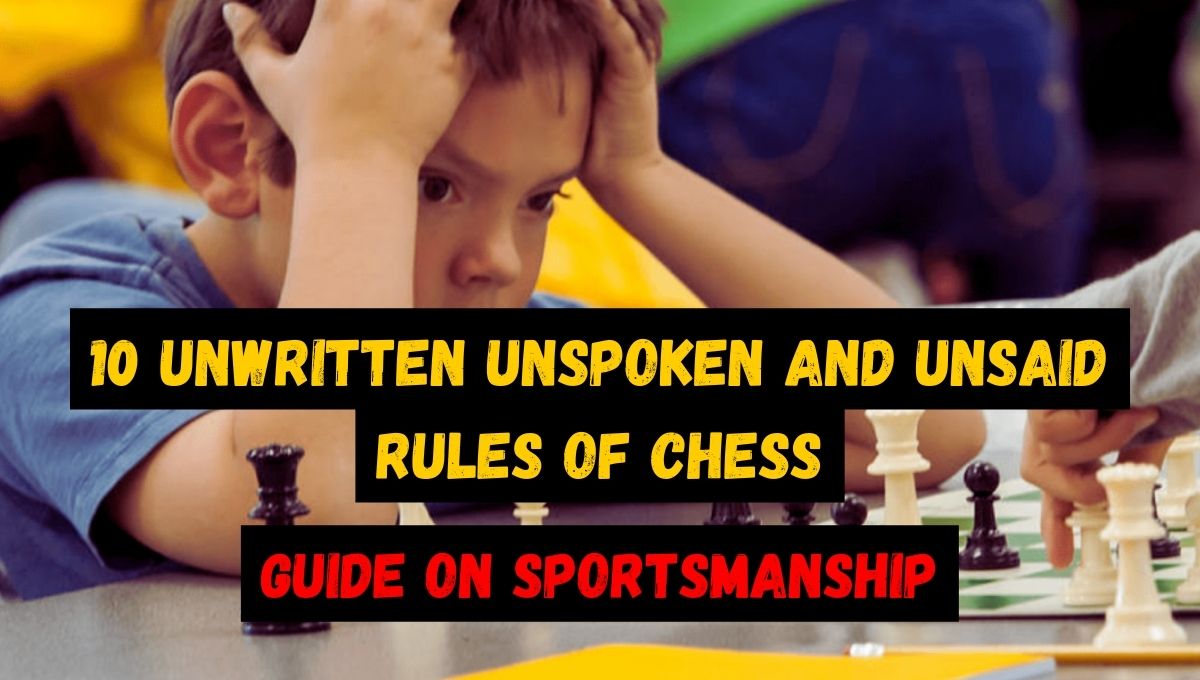In the world of chess, where talent, dedication, and hard work wins, there exists an unspoken wisdom that goes beyond the rule books and official regulations.
These are the unsaid and unwritten rules, the subtle codes of conduct and mutual understanding that underpin the fabric of sporting culture.
While the spotlight is always on the winning player, it is the adherence to these unwritten guidelines that defines true sportsmanship.
Listed below are some of these unwritten rules of chess.
1. Doing What is Right When No One is Watching
In chess tournaments, not all games have Arbiter or cameras keeping an eye on every move. This can sometimes lead to situations where players might be tempted to bend the rules.
Imagine this: you touch one of your chess pieces. In the game, that means you have to move that piece. Now, here’s the thing—when no one’s watching closely, it might seem easy to pretend you didn’t really touch it. Who would know, right? But even if no one catches you, that’s like telling a fib, and it’s not really respectful to the game.
Another situation could happen in a fast game like blitz. You might think about moving your knight in a wrong way that’s not allowed. And because everyone’s moving quickly, your opponent might not notice the sneaky move. It’s cheating, but hoping no one will notice.
Here’s the deal: respecting the board means more than just following the rules when someone’s looking.
It’s about being true to the game and to yourself. It’s like saying, “Even if nobody’s watching, I’m going to do the right thing.” It’s like having a strong bond with the game and its history.
So, whether there’s a referee around or not, remembering to respect the board means you’re keeping the game’s values alive.
It’s about being honest and keeping the game fair, even when nobody seems to be keeping an eye on you.
2. Acknowledging the Handshake
In chess, a handshake is not just a formality but a sign of sportsmanship and respect.
Before and after a match, players usually shake hands, symbolizing a mutual acknowledgment of the mental duel that’s about to take place.
It’s a gesture that transcends language and cultural barriers, emphasizing the essence of fair play and healthy competition.
3. Maintaining Silence
Chess is a game that demands intense concentration, and silence becomes a crucial part of this mental atmosphere.
Players often avoid unnecessary chatter during a match, allowing both opponents to focus on their moves.
This silent communication fosters a respectful environment and showcases the gravity of the contest unfolding before them.
In a FIDE rated tournament you are bound to stay silent during games but in other tournaments where staying silent is not a rule, it’s an unwritten rule that you must remain silent during the games.
4. Offering and Accepting Draws and Losses Gracefully
Continuing to play until the very last move when neither player can win is not the right approach.
If both you and your opponent recognize that the game won’t change and will end in a tie, or if one of you is clearly on the path to losing, it’s a better choice to stop playing and agree to a tie or let the other player win.
This shows your understanding of the situation and your respect for both your time and your opponent’s.
Additionally, repeatedly asking for a tie after every move isn’t a good practice. This can make your opponent feel uncomfortable and it’s not a fair strategy. It’s like trying to win by bending the rules, instead of relying on skillful play.
5. Avoiding Flaunting
While showcasing your skills on the board is commendable, purposely delaying a victory to flaunt your moves in front of your opponent and spectators can be considered unsportsmanlike conduct.
It’s vital to recognize the delicate balance between celebrating your win and acknowledging your opponent’s hard work—this is a defining trait of a genuine chess enthusiast.
6. Staying for the Post-Game Analysis
Win or lose, the post-game analysis offers a unique opportunity to learn and grow.
Even if the game doesn’t end in your favor, sticking around to analyze moves with your opponent or a fellow player can provide valuable insights and foster a culture of continuous improvement.
7. Showing Humility in Victory and Grace in Defeat
A core virtue of any sport is the ability to handle triumphs and setbacks with equal grace.
In chess, this translates into acknowledging your opponent’s skill and effort, regardless of the game’s outcome.
A genuine handshake and a few words of praise can go a long way in fostering a positive and respectful chess community.
8. Maintaining Dignity and Composure
In competitive chess, it’s really important to stay calm and show respect.
Making big body movements like yawning loudly, kicking the table, or moving around in your chair too much can make it hard for both players to focus.
This kind of behavior isn’t polite and doesn’t show good sportsmanship.
Chess is all about using your mind to outsmart your opponent, and doing these things takes away from the thinking part and the challenge of the game.
9. Respecting Your Opponent’s Space
Just as maintaining silence is vital, respecting your opponent’s personal space is equally important.
Staring down or eye-balling your opponent can be unnerving and unsettling, creating an uncomfortable environment for both players.
Remember, the game itself is the arena for competition; there’s no need to invade personal boundaries to gain a psychological advantage.
True victory in chess is achieved through skillful play, not intimidation tactics.
10. Playing the Board, Not the Player
Chess is a game of logic and calculation, and your focus should be on the board and the pieces, not on your opponent’s demeanor.
While it’s natural to read your opponent’s reactions and body language, over-analyzing these cues can lead to misjudgments and mistakes.
Let the pieces on the board dictate your moves, and rely on your strategic prowess to outmaneuver your opponent.
